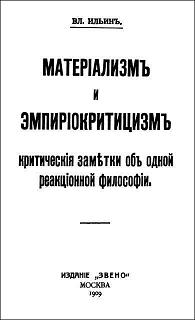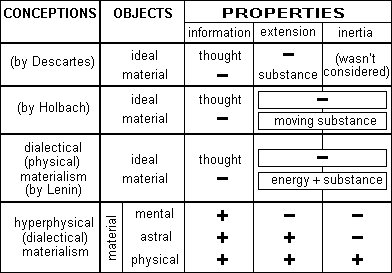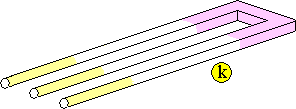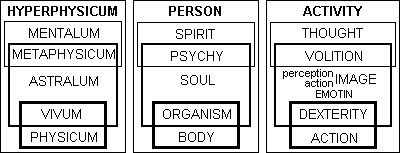|
 |
There is the brief variant of the notes before you
The full variant of them is here
|
The CENTURY of a FATAL FLAW
True is not born from true.
True is born from mistakes.
xxx
Pyotr L.Kapitsa (1894-1984)
True happens to be so simple, that one doesn’t trust in it.
Fanni Lewald (1811-1889)
|
Prints: the auther's
x x x x xx
ÌEC citations
x x x x xx
all other citations
|
• WHAT is MATTER
• ALL, but NOT ALL
• HYPERphysicum, but not PHYSICUM
• WHICH is PRIMARY
• EFFICIENCY of THOUGHT
• HYPERPHYSICUM is TRIPLE-LEVEL
• HIERARCHIC KIND of HYPERPHYSICUM
• MISSED POSSIBILITIES
|
Exactly a hundred years,
in May 1909 MEC (the Materialism and Empirical Criticism) was published.
A character of this influence is ambiguous. It is
• positive in its basis, in its intention plan, it promotes progress, but simultaneously
• negative by its real influence, it retards progress, because the conception given by MEC, which has become generally accepted and which defines till now scientific ideology, contains a principle mistake, not discovered till now.
In which extent the mistake may be considered as fatal, why it was committed, which paradoxes it was followed – these are the themes of present remarks.
The discovery of radioactivity (1898) has turned into a “crisis of physics” ("The matter has disappeared" – this is a possible way to express ... difficulties which have made this crisis). Just at that time the fact was found that the science had no precise notion of
WHAT is MATTER (in general, as substance itself) (full) (Pycc)
Its definition as the objective reality, given in ÌEC, has become generally accepted. Objective means (in ÌEC essence, but not ÌEC text) it exists irrespective of other realities existence. Today it seems a triviality but at that time it was a principle novelty. So, Paul von Holbach (1723-89), a
French Encyclopaedist, did not consider objectivity of matter: “we discover in matter, extent, mobility, divisibility, solidity, gravity, and inert force”. A question WHAT is matter objectively (not only which “we discover”) remained beyond consideration.
| |  |
Accordingly to this fundamentally new definition, the concept of matter has been expanded. Energy, power fields began to be admitted as matter too, besides massive and volumetric objects, i.e. besides that matter part which Rene Descartes (1596-1650) defined as “extent” (prolixus, etendu). In this expansion the real, intrinsic, not only formal difference is revealed between the new representation and the one of P. Holbach who believed massiveness to be one of matter attributes, inevitable traits.
The contribution to the science progress is doubtless and fundamental, comparable on scale with Kopernik's contribution.
But the ÌEC
author – VL. ILYIN, or Lenin, or V.I. Ulyanov (1870-1924) has stopped halfway when he extended concept of matter.
ALL, but NOT ALL (full) (Pycc)
Lenin specifies: the only "property" of matter ... is a property to BE an OBJECTIVE REALITY. Only (!). Everything, which is real, is matter. No restrictions. Actually he asserts, that
|
matter and OBJECTIVE REALITY are synonyms. |
BUT at that he imposes a restriction on OBJECTIVE REALITY:
nothing can exist beyond "physical", external world.
This restriction not only creates a (fundamental!) conflict between two author's statements, but also contradicts practice: the internal, beyond-physical world of own thoughhts exists not less objectively and really, than external world, than own body.
Remaining consecutive, Lenin should
• admit materiality of a thought (that a thought is material);
• admit that person’s thought is real not less than his body, that it does not sit inside of his brain just as a melody does not sit in a flute;
• admit materiality of information just so, as he has admitted materiality of energy.
But such a consecution, logicality would mismatch and even contradict his purposes which he has manifested in the last, the fourth item of the Conclusions of his ÌEC as protection of the historical materialism against fideism.
Lenin-researcher-philosopher has entirely obeyed to Lenin-revolutionist-professional.
Having not admitted materiality of information, Lenin has divided the reality into the material world and the ideal world, i.e. has followed Descartes, nevertheless without an overt reference to him, by default – probably because Descartes has offered his own proof of God existence.
And Descartes, having divided the WHOLE reality into these two worlds not precisely enough, had differentiated, separated the massive substance by such a trait as "extent"
(speaking medically, by a not pathognomonic trait – it is a symptom, typical to a SINGLE disease, which facilitates diagnostic of this disease. Extent is attributive not only for corporal substance. For example, a wave on a water surface is extensive, but nevertheless it is incorporeal: water is substantial, inert, massive, it has weight; a wave is not),
had combined information and energy together into a chimera (an ideal world), which complicated comprehension, discovery of their mutually independent reality (just this difficulty Lenin has overcome!). Thereby Descartes (and Lenin after him) has ignored the Nature unity, existence in the world ONLY a single world, the material, real world (but real – it is already by Lenin, by his definition of materiality!).
Absence of the clear comprehension, that information is a form of matter, is non-physical substance, equal to physical substances and to energy as an element of Nature, has resulted (by the present moment, 2008-09) in –
• absence of an accepted (philosophical) definition of this concept;
– in mutual identification, mixture of the concept of information with concepts –
• knowledge – in philosophy, psychology;
• quantity – in mathematics;
• signal – in physics.
HYPERphysicum, but not merely PHYSICUM (full) (Pycc)
Asserting There is nothing in the world except moving matter, and moving matter cannot move somehow otherwise than in space and in time, Lenin commits two mistakes:
• there is ignored here existence of thought, which doesn’t move, which exists outside of spatio-temporal continuum ( ℜ ) at all. A thought is nowhere concrete or – it is the same – it is everywhere, it belongs equally to any place of ℜ, it is "spread, smeared" along ℜ as the whole;
• there is spoken here actually about massive substance: just it and only it can move in space and in time. Uniting concepts of substance and movement into a single whole, the term of moving matter, Lenin rigidly adheres movement to concept of physical reality, physicum.
Meanwhile, though one cannot even in his thoughts separate, release a physical object from its length, and, consequently, "extent" is an attribute of physicum,
nevertheless one can separate an object length from its body, from those atoms, of which it consists. But one can make it only mentally, and the "separated" length would already be not the length itself, but a thought about the length. Hence, the length in itself, as an one-dimensional space is metaphysical.
Length, extent is natural property of each of dimensions of the three-dimensional space – as well as of an one-dimensional one. Hence, space in whole is metaphysical.
Time is a background of processes just as space is a background of objects. Time is their attribute, but NOT their element. Time doesn’t, as well as space, possess the property of inertia, massiveness.
One cannot even in his thoughts separate, release a process from its duration.
Only mentally one can separate a process duration from its essence, from those objects, changing of which is just the process. But the "separated" time would already be NOT time itself, but a thought about time.
Hence, ℜ (the spatio-temporal continuum) is metaphysical.
Hence, movement – the function of space and time – is the metaphysical phenomenon or object (as a studying subject) metaphysical.
Forces are also not massive, not inertial, i.e. are metaphysical. Hence, force fields – totality of forces in space – are metaphysical objects.
Hence, the whole natural science, starting with physics, and physics – starting with mechanics, is actually the science about hiperphysicum, but not about physicum itself, substance, bodies.
The world in which we live is of hiperphysical kind: (in it) active, metaphysical forces induce passive, inert physical bodies to be changed.
“The reason of gravitation, in Newton’s opinion, can be only non-material”. Sergey I. Vavilov (1891-1951) wrote this in 1942-44 [ 21a ]. Now, agreeing with Newton (1642-1727) in essence, we formulate it differently: gravitation is non-substantial, but it is material, it is metaphysical.
WHICH is PRIMARY (full) (Pycc)
Lenin formulates: the principal philosophical line of materialism is from being to thinking, from matter to sensation. And this very philosophical line is, by default, true. It is such a half-truth which is, as usual in similar cases, more difficult for analyzing, than an utter error.
Yes, this statement is really correct concerning ontogenesis, a separate person, a separate perception event etc., BUT only if being is understood as an external environment in which an individual functions who possess thinking, and only if matter is understood as the same environment from which the individual gets his sensations.
However, Lenin makes this assertion as the philosophical line, as a principle, universal statement concerning Being as the material world, and Thinking as the ideal world. I.e. actually he has accomplished a generalization, extrapolation, transition from a particular to the general, and he has made it without any substantiations, by default, as allegedly obvious, doubtless admissible action.
Nevertheless this obviousness is deceptive. And, which is the main, Lenin has stopped halfway here too.
EFFICIENCY of THOUGHT (full) (Pycc)
To form a perception image is not a proper goal of an individual, but it is an intermediate deed, auxiliary procedure necessary for choosing of adequate activity in the same environment. A thought effectively influences, affects upon physical structures, and first of all – upon the own body of a thinking and acting subject.
Lenin didn’t consider (in ÌEC) this problem. V.I. Vernadsky (1863-1945)was considered it. Discussing some questions connected with the noosphere problem, admitting thought efficiency, he noticed as a paradox [ 20b ]: Thought is not a form of energy. How can it change material processes? He did it quite reasonably: only something material can influence upon matter.
The question HOW can it is interesting, but the main is – it can! And, hence, there is not true the primary philosophical line of materialism – of middle-of-the-road, inconsistent, physical materialism.
But if one goes along the way offered by Lenin further than Lenin went, without Lenin’s inconsistency, if he admits materiality of individual's thought and materiality of information, independent on an individual, he’ll come to hyperphysical materialism, on the base of which he manages to answer HOW.
HYPERPHYSICUM is TRIPLE-LEVEL (full) (Pycc)
Hyperphysical practice, in particular one of healing, shows that metarphysicum consists of two hypersubstances of intrinsically different qualities.
Analogically as each physical object is really hyperphysical, but not merely, not only physical because it has inevitably its own metaphysical component, so each meta-physical object has its own meta-meta-physical component. We’ll name further meta-physical reality as astralum, and meta-meta-physical reality as mentalum. Astralum is the hypersubstance of energy, mentalum – of information.
Mentalum objects possess only information (see the table). Astralum objects possess also
(furthermore information) many other properties, and first of all – spatial, such as form, size, localization.
| |  |
Hyperphysical materialism, expanding borders of dialectic (and in fact physical) materialism by an admission of materiality (i.e. of objective existence) of
non-physical realities, does not reject universal dialectic principles of development – transition of matter’s quantity into its quality etc.
Each physical object has its metaphysical component, but not on the contrary: there are "cleanly” metaphysical objects. The image of imagination presented in figure (k) is of such a kind.
Similarly not each mentalum object has its astralum component.
| |  |
Space is astral (astralumal). It is metaphysical, but not mental (mentalumal): space has no mental properties – the same as a thought has no spatial traits. Space –
• as a concept (information), as (human) idea, as a thought of space – is mentalum;
• as an objective reality, as an element of Nature, of matter – is astral;
• is perceptible physically only owing to presence of physical objects in it (not excepting a feeling subject) – as a hole of a ring bagel is perceptible only at presence of the bagel itself.
Radiations, which possess only mass of movement, but not of rest, may be admitted as a form of a matter, transitive (intermediate, boundary) between astralum (energy) and physicum (substance).
Analogically one may admit existence of a matter form transitive between mentalum and astralum. Just such kind of nature can be resides in a psyche element, formed at magic practice and named a thinking-form.
The world is uniform. Borders between substances (their qualitative difference) are essentially important, but they don’t separate adjacent substances, don’t isolate mentalum from astralum and astralum from physicum.
HIERARCHIC KIND of HYPERPHYSICUM (full) (Pycc)
In a view of such approach to the Nature inanity of the problem of the primary philosophical line of materialism, of primacy (as a reason of existence) either of being, or of thinking is revealed: both of them are matter. But if to consider the primary line as an orientation of active influences, not as the reason of existence, so (then, in that case) mentalum influences (can actively influence) – as the same practice shows – upon astralum, and astralum – upon physicum (upon substance), BUT direct influence of mentalum upon physicum is impossible.
The mechanism of these direct influences is – by Georg Wilhelm Friedrich HEGEL (1770-1831) – the metamorphosis, transition of matter quantity (concentration) into change of its (hyper)substantiation quality.
Return influences are possible only as passive resistance to active ones.
In order to display this (dynamical) hierarchy (hierarchicalness) graphically (in a static scheme) one have to divide mentalum and physicum so that they did not adjoin – to the detriment of the scheme accuracy: really, in the nature mentalum covers astralum and astral – in its turn – physicum (here VIVUM is the total of all alive, biosphere).
| |  |
MISSED POSSIBILITIES (full) (Pycc)
as a result of the ÌEC author’s inconsistency, of incompleteness of his contribution to the science progress show, in what measure they may be considered as fatal, in particular – for the science itself.
Hyperphysical materialism (as well as Fundamental psychology, its component) takes only its first (the most difficult, as usual) steps. The author develops this theme, at total absence of financing, not much longer than 30 years. The first publication [ 1 ] – 1990 (right after liquidation of censorship). Defence a thesis (the single hitherto) – 1997. And nevertheless there is already now attained some significant. But there could be attained both earlier and more. In particular:
Hierarchy (hierarchicalness) of mutual relations of hypersubstances – mentalum, astralum and physicum – could be discovered much earlier (and not by the author of these notes, but by somebody else).
Then it would be clear initially (and not to somebody other, but to Einstein himself), that space curvature by mass is impossible, that it not an explanation of gravitation, but only a new term, and the unsuccessful term.
The difference between information and knowledge (though both of them are mentalum) could be realized much earlier (and not by the author of these notes, but by somebody else).
Then would not appear (ostensibly physical) SCHRÖDINGER’s (Erwin Rudolf Josef Alexander SCHRÖDINGER, 1887-1961, – the Austrian physicist – theorist, the Nobel prize winner (1933) on physics) paradox (discussed from 1935) about a cat which remains simultaneously still alive and already dead until SCHRÖDINGER (or somebody else) looks at it.
Then the constant increase of matter quantity (i.e. its inconstancy) in the Nature would much earlier be revealed.
The nature of life could be understood the criterion of distinction between lifeless and alive, the border – intrinsically not quite precise – dividing them could be found much earlier.
Then mechanisms of evolution could be understood much earlier and it could become commonly admitted that evolution is teleological.
Then out beyond-genetic mechanism of heredity could be found much earlier.
The nature of psyche and of its base elements – images, emotion, memory, attention, volition – could be understood much earlier
Then, on this base it could much earlier be –
• proved theoretically and enriched methodically efficiency of healing,
• begun forming of integrative medicine which efficiency surpasses the sum of efficiencies of both its branches – academic and alternative medicines,
• understood mechanisms of narcotic and others psyche dependences
• developed methods for painless, fast and reliable liberation psyche dependences; only from the nicotinic (the most persistent) dependence there are not less than one and a half thousand persons liberated (the exact statistics is now unavailable) – and it only by one operator (the author of a method).
At last, and this can be much more important than all other (in spite of this theme itself can be a problem of vaguely remote, even doubtful prospects), there could be much earlier –
• the theoretical substantiation gotten of defeat kind of egoistical behaviour comparatively with altruistic one – the defeat kind for an egoist himself (!),
• the understanding gotten that strategic egoism demands tactical altruism,
which creates an ideological (scientific) base for possibility of formation of a civilization of new in principle, conscious-, ideologically-matriarchal type, in which not only mothers would be directed toward good for their children before good for them themselves, in which not only women, but ALL would be guided by the principle “A wise person of this world acts with other people so, how he would like, that they acted with him”.
Just such a society, based on (mutual) encouragement, but not on suppression (dictatorship – no difference which – any), would correspond to concept of "communistic", irrespective of a level of its economic and technological progress. To form such a society, achieving material abundance of the today's society of ideologically-patriarchal type, is impossible: somebody always keeps up with the Joneses.
Still in 1902 a German psychiatrist (1862-1939) noted: At studying history of scientific discoveries we often happen to meet three stages: in the first (1) inventors is ignored, in the second (2) – he is contested, and if he wins then (3) it is declared, that he has invented nothing new and that his discovery was known still much earlier [ 84 ]. And indeed, ÌEC got at once sharp and concerted criticism (2). However Lenin was criticized not for incompleteness of ÌEC radical novelty, but on the opposite, for allegedly excessive radicalism. And now (3) –
• in 1994 a professor, who taught during 30 years students at philosophical faculty of the Moscow State University, declared that the concept of matter was defined much earlier than by Lenin, for example by Holbach (though it is quite clear, with which fulsome piety he praised ÌEC before it came into vogue to criticize Lenin sweepingly and how he demanded the same from his students);
• today at the (Russian) site http://www.peoples.ru/science/philosophy PEOPLE – the site is quite capacious: 34759 persons, among them 283 (!) philosophers – Lenin is not even mentioned at all.
Yes, Albert Moll was right.
A.S. Markon A Ñentury of a Fatal Flaw
Summary-annotation.
The natural science, starting with physics, using today representation of matter as of objective reality, follows actually after V.I. Óëüÿíîâ-Lenin (1870-1924). It was he, who entered this representation into the science, by publication of his MEC (“Materialism and Empirical Criticism”) exactly a hundred years ago. So the concept of matter has been expanded: energy has been admitted as a form of matter too. This contribution to the science progress is comparable with the contribution (for example) of Copernicus.
On the other hand, a principle mistake is committed in MEC. Contrary to logic Lenin has stopped halfway and has not admitted materiality of information though it is not less objective and not less real. This mistake was replicated during decades in millions and millions copies in tens languages as the conclusive true; that constrains the science progress. In particular it constrains –
• to find out the hierarchical character of relations between metaphysical reality and physical one;
• to understand the nature of life, to recognize teleological character of evolution, to find out the beyond-genetic heredity mechanism;
• to understand the nature of psyche and mechanisms of such its base elements – as image, emotion, memory, attention, volition;
• to synthesize methodological approaches of the academic and alternative medicines, and so to get results inaccessible to each them separately;
• to understand mechanisms of psyche (in particular of narcotic) dependences, and to have an ability of painless, fast (almost instant), reliable liberation from them;
• to get new in principle approaches to ethical and social (up to political) problems (and ability of their solution).
This material is accessible completely in the I-net at <http://www.PsiMatter.marcon.us/mec.php>.
This material, allowing to increase sharply efficiency of actual practice in many spheres of activity, and simultaneously concerning scientific outlook bases, it can be of interest for
philosophers,
physicists,
biologists,
medics (especially for psychiatrists, narcologists),
psychologists.
The key positions of this material have been published earlier in monographies (in Russian)
Ðsyñhîlîgy of Håàling or of Îññult Mådiñinå (1990)
Introduction into Håàling (1992)
Fundamental Psychology (2004)
Hyperphysical Materialism (2006)
Reincarnation (2008) and others.
|
 |
|
|
